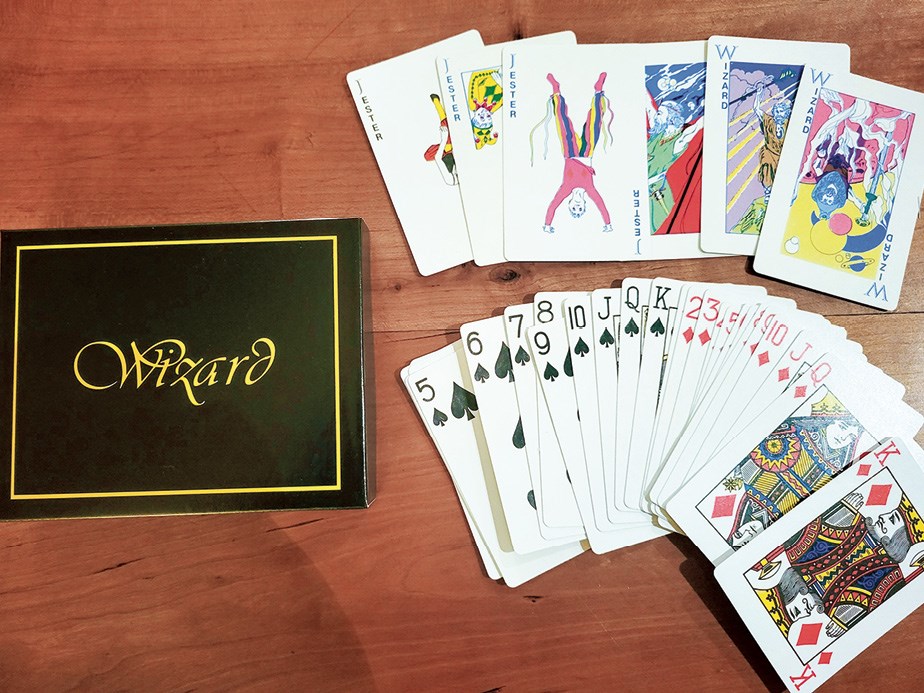Ken Fisher and his wife, Joan, were playing bridge at their Haliburton cottage in 1983 when they began to discuss the game’s shortcomings. First, it required four players and all should be at about the same level of skill if the game is going to be enjoyed. Second, bridge is enormously complex and requires a long time to learn and years to master.
This got them thinking about developing a game that could be played by three, four, five or six players, and was easy to learn and enjoyable to play but challenging enough to hold the interest of even skilled contestants. Intrigued by the possibilities, Fisher did some research and turned up a card game called O Hell that was almost what he wanted. With the help of his son Scott, he tweaked and modified the game until it satisfied his requirements. By adding eight cards to the standard deck of playing cards (four Wizards and four Jesters) they produced Wizard, and two million copies later, their invention has been called “the greatest card game ever.”

It was 1984 and Trivial Pursuit was becoming a sensation. An English as a Second Language teacher in Toronto, Fisher was already in on the trivia craze, writing a series of books called Super Quiz that later would develop into a syndicated game in newspapers across North America and is still running today. However, he could find no one interested in Wizard.
“I even used my contacts with the Trivial Pursuit guys,” he says, “And they took it to Parker Brothers, but they weren’t interested.”
Despite the rejections, Fisher knew he had a great game given that everyone who actually played it was hooked.
“My friends all loved it!” he says with a laugh.
He persisted, and finally found private investors who believed the game could be a success. Using their money, he finalized the design and had 10,000 of the decks printed himself.
Marketing his invention was the next hurdle. “I’m no salesman,” Fisher admits, “but my wife is fantastic at sales. She and I would go to Christmas fairs, craft shows and the like, every Sunday and set up a booth to sell the game.”
Fisher and his wife sold Wizard privately for several years, even giving copies away, knowing that anyone who played would want to buy their own deck. Eventually, in 1986, Waddington Publishing decided to take the game—a move that paid off for the publisher, says Fisher, when they had to go from a four-day work week to six days to keep up with demand.
Like bridge, Wizard depends on bidding skill. Players must declare how many tricks they will take in each hand, and are rewarded for being accurate, penalized for winning too few or too many. Unlike bridge, the rounds begin with one card dealt to each player and increase in number of cards round by round until the deck is used up. Wizard and Joker cards add to the unpredictability and fun.
In 1994, the game was licensed to U.S. Games in Connecticut, a games manufacturer mostly known for production of Tarot cards. Since then, the game has become an international hit, with versions in Japanese, Polish, Hungarian, and many other languages.
“It’s bigger in Europe now than North America,” says Fisher, who notes that since 2010 international tournaments have been held in several European cities. Wizard champions, crowned at these international tournaments, have come from Austria, Germany, Hungary, and Greece (there has never been a North American champion). This year, the tournament will be held in Vienna, Austria in October, and Fisher is sending two representatives from Canada, two from the U.S., and one from Mexico, in hopes of breaking the pattern. National representatives are chosen from players who demonstrate their winning ways on the online version of the game, launched in 2020 (a Wizard app for Apple and Android has been available since 2010).
An eight-year-old can play if they have any familiarity with card games
Fisher says that new variations of the game are being launched, including a “Camelot” version and a “Magic” version and these, along with the original, are packaged together in the “Omnibus” Wizard edition to be launched in time for Christmas. Not entirely enthusiastic about the new versions of his game, Fisher is quick to point out that he has been insistent that its best features have not been diluted.
“A ten-year-old can play,” he is proud to point out. “Actually,” he adds, “An eight-year-old can play if they have any familiarity with card games.”
He estimates that about 25,000 copies of the game have been sold in Canada every year “for at least the past 15 years,” so thousands of Canadians are currently enjoying Wizard.
On the Wizard website, fans have posted accolades for the game that go beyond the enthusiasm one might expect of an enjoyable pastime. One says that their grandfather enjoyed the game so much that they decided to bury his copy with him when he passed away. Another claims that their family has been playing the game for four decades and another claims that it helped his mother recover from a stroke, while another says that he and his girlfriend will feature the game at their wedding. A woman from Texas is so enthralled with the game and fearful that the online version will not survive financially that she has offered Fisher her entire Texas State pension of $800 per month as a contribution to keep the game on the internet. (Fisher declined.)
Now well into his 80s, Fisher is still active in the Wizard community and is a revered figure among the game’s many devotees. He continues to publish his Super Quiz games for the North American syndicate newspapers and the fourth edition of his “Isaac Asimov presents Super Quiz” book has been released. A Fonthill resident for the past four years, Fisher enjoys a less frantic lifestyle since his move from Toronto but doesn’t seem to have slowed down appreciably. His brief bio on the Wizard webpage suggests a man young at heart, concluding with his personal dictum: “I thought getting old would take longer!”



